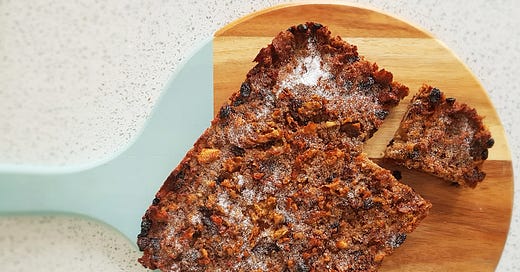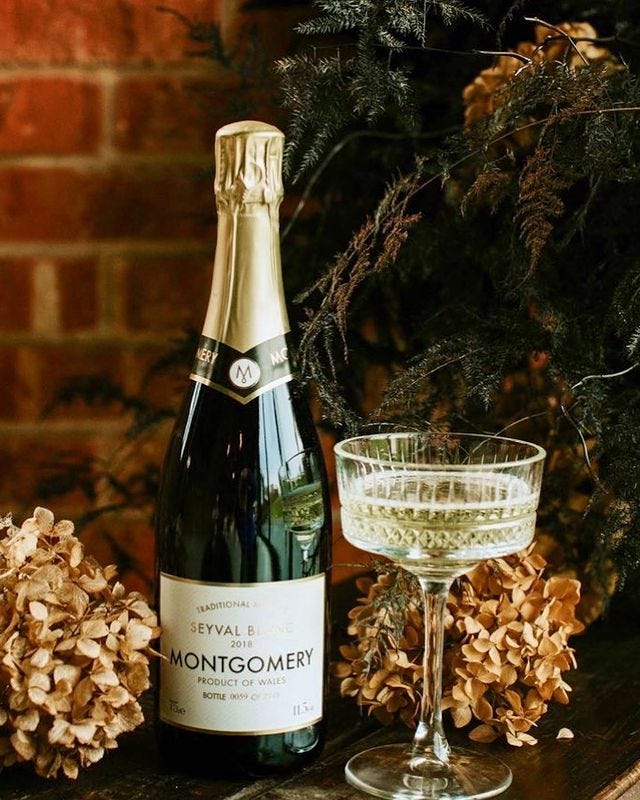“That’s ‘for best’” or “Just in case someone comes” where frequent words at my Nannie Gwen’s house. It seemed parts of her home were reserved purely for guests – this included cut-glass glasses, cups and saucers, the ‘better’ dinner set and an entire nest of tables. If people were coming for a party or an evening, there would be tins of red salmon (it’s posher than pink) that had been slathered with white pepper and malt vinegar before being distributed on little upturned half baps. These would be suitably arranged on plates lined with paper doilies. There would be a bit of beige (sausage rolls or mini-pasties), dishes of nuts and crisps such as Chipples or those ones shaped like the suit signs from a pack of playing cards. And then there was drink: beers, sherry, cider, bottles of fizzy pop of varying shades, and possibly some sort of homebrew from one of the family. Regardless of the celebration, one thing’s for sure, there was always plenty to go round.
I suppose it’s always been ingrained in me that if people are coming over, you give them everything you have – “better to have too much than not enough”. But it’s not just my family, I think it’s a Welsh thing. The need to feed people. To be hospitable. To play the ultimate host even if someone’s only popped in for a cup of tea. I mean, you can’t visit my Great Auntie Den without having a biscuit for each hand with your cuppa – and a piece of cake to take home.
It doesn’t matter what the occasion in Wales – celebration or commiseration – people seem to want to nourish or care for each other – to show their love through sustenance. No sooner has someone fallen over in the street than they are ably helped into a chair rushed out of a house or shop, and a cup of tea is in their hand and a group of people determined to wait with them until either the shock of a stumble has worn off or the paramedics have been to check them over.
I know it might sound a bit whimsically trite or perhaps a bit of a sentimental generalisation, but I think there is definitely a difference in a Welsh welcome to any other, and Welsh people on the whole are friendly and hospitable – as any train from Paddington to Swansea will demonstrate. But this Welsh welcome has been documented through the centuries. Geraldis Cambrensis (Gerald of Wales) the 12th Century Cambro-Norman archdeacon of Brecon said of Welsh hospitality:
“No one of this nation ever begs; for the houses of all are common to all; and they consider liberality and hospitality amongst the first virtues. So much does hospitality here rejoice in communication, that it is neither offered nor requested by travellers, who, on entering any house, only deliver up their arms. When water is offered to them, if they suffer their feet to be washed, they are received as guests.”
And I love how Jan Morris describes it in her 1984 book The Matter of Wales:
“Knock on the farmhouse door, wherever you see the wood-smoke from the chimney, and a cup of tea is almost certainly yours. Ask your way in Pontypool, and you may be chatting there for half an hour. Dewch i mewn, ‘Come in’, is a true Welsh catchphrase, and one of the prime ambitions of any self-respecting housewife is to offer her guests better cake, or more varied canapés, or most importantly of all more immediate tea, than anyone else.”
Perhaps my love of feeding people, the joy of sharing food and watching people enjoy food and drink is innate. Just another part of Welshness. So dewch i mewn whevever you like, but I just need to pop out for some doilies first!
The Recipe
Nanna Lena’s old-fashioned bread pudding
I’ve spoken before about my love of leftovers and how I like to use everything I possibly can rather than letting it go to waste – even if it sometimes results in some strange flavour combinations. You’re safe with this recipe though, it’s a tried and tested one for using up stale bread that’s no longer soft enough for a decent sarnie or has gone so hard you could maim someone with it.
I always remember my Nanna Lena making this, soaking the bread in a big bowl, which always seemed bonkers to us as kids, until it came out of the oven transformed into a moist, fruity cake.
There are lots of ways to make this. Many recipes say to soak the bread in milk rather than water, but that’s a waste of milk to my mind. Some add extra butter to give a richer flavour and firmer set, but – and I can’t believe I’m saying this – I don’t think it needs more butter.
Ingredients
225g stale bread
2 tea bags
Cold water
Butter for greasing
50g caster sugar, plus a little to sprinkle on top
125g dried fruit
2 free-range eggs
1 tbsp milk
1 tsp mixed spice
Pinch of salt
Method
Tear the bread into small pieces and place in a large mixing bowl with the tea bags. Cover in cold water and leave to stand for a least 30 minutes or until the bread has turned soft and squishy.
Preheat the oven to 180°C/350°F/Gas Mark 4, and grease a small flat square or rectangular tin with butter.
Discard the teabags and drain the bread mix using a colander, squeezing out as much of the liquid as you can. You can do this with your hands or using a small plate to press down on the mixture.
Put the bread back in the bowl and then ddd all the other ingredients and mix thoroughly so you’re left with a thick batter. Pour it into the prepared tin and pop in the oven.
Bake for about an hour, keeping an eye out that the top doesn’t burn. Remove from the oven and allow to cool before chilling in the fridge. Sprinkle the top with sugar before serving.
I just like it cold as a cake but some people enjoy it with custard. Apparently, housewives in the South Wales valleys mining communities used to prepare this in large quantities and sell it from the doorstep or at local markets to make extra money for the family.
If you try the recipe out, don’t forget to tag any photos with #mywelshkitchen.
The Playlist
To me, cooking and music go hand in hand, whether that’s singing at the top of your voice using a wooden spoon as a microphone while waiting for pasta to boil, or dancing around with the oven gloves on as the oven timer counts down. Here are this week’s ideas for your Welsh Kitchen playlist.
Try not to start tearing up with the first track this week thanks to Ivor Emanuel and the Rhos Male Voice Choir. But never fear, Duffy is on hand to get you dancing in track number two.
My Little Welsh Home by Ivor Emanuel and Rhos Male Voice Choir
Mercy by Duffy
The Pantry
Good food is nothing without good ingredients and thankfully there are plenty of fantastic Welsh products on the market. Here is where you’ll find recommendations to stock up your cupboard, fridge or fruit bowl.
Sparkling White Seyval Blanc
This week was Welsh Wine Week. Yes, Welsh wine is a thing. In fact, it’s thought that the Romans planted vineyards and cultivated grapes in Wales first. And while Wales has since been much more of a hedgerow (e.g. elderflower) and allotment (e.g. parsnip) wine country, over the last two decade or more, Welsh vineyards have been popping up – and winning awards for their wine. One such wine is this glorious fizz from Montgomery Vineyard. The 2018 Sparkling White Seyval Blanc won a silver medal in the IWC International Wine Challenge this year.





